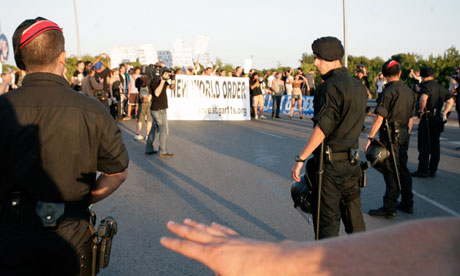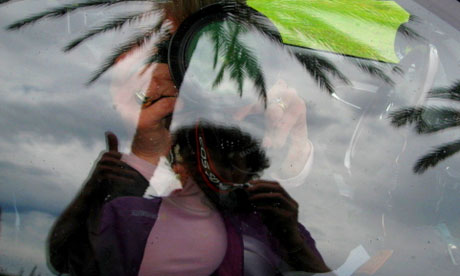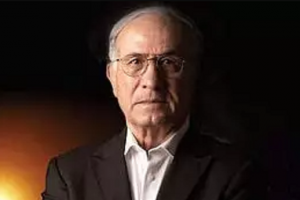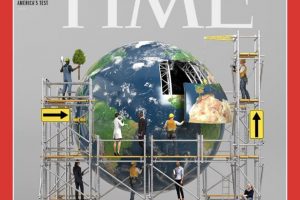 A huge agenda of global issues was crammed into four days of ‘secret’ meetings by a mysterious group of power brokers. But who elected them and why are we paying for them?
A huge agenda of global issues was crammed into four days of ‘secret’ meetings by a mysterious group of power brokers. But who elected them and why are we paying for them?
Weary and bramble-scratched, elated by the press coverage, and sick of riot vans and lukewarm Spanish omelette baguettes, we return from Bilderberg 2010 with the following thoughts uppermost in our tired mind:
• ‘Global cooling’ is on the cards
Check out the agenda for Bilderberg 2010: “Financial reform, security, cyber technology, energy, Pakistan, Afghanistan, world food problem, global cooling, social networking, medical science, EU-US relations.” That list is a window into your future. Don’t think for one minute that it isn’t. And don’t ignore it, because it isn’t ignoring you.
 I love how “social networking” must fry the Bilderbergian mind. On the one hand, as Zuckerberg of Facebook says, privacy is no longer a social norm so it’s okay to milk the networking sites for information, social trends and dissident thinking; however, you can’t stop the people from arranging a meet-up to discuss internet censorship or the rights and wrongs of “global cooling”. Speaking of which, Bill Gates (Bilderberg 2010) is funding “cloud whitening” technology; trials start soon. Global dimming isn’t just something that happens every time Big Brother starts. On the basis of this agenda, I think we can expect a lot of statements about cutting-edge cloud-technology trials in the next 12 months. If it works in Dubai, it can work in Britain too…
I love how “social networking” must fry the Bilderbergian mind. On the one hand, as Zuckerberg of Facebook says, privacy is no longer a social norm so it’s okay to milk the networking sites for information, social trends and dissident thinking; however, you can’t stop the people from arranging a meet-up to discuss internet censorship or the rights and wrongs of “global cooling”. Speaking of which, Bill Gates (Bilderberg 2010) is funding “cloud whitening” technology; trials start soon. Global dimming isn’t just something that happens every time Big Brother starts. On the basis of this agenda, I think we can expect a lot of statements about cutting-edge cloud-technology trials in the next 12 months. If it works in Dubai, it can work in Britain too…
• You can’t keep a good story down
If I had to pick the point when Bilderberg finally broke through into mainstream news, it would be when the BBC News Blog published a round-up of Bilderberg reports. Twelve months ago, this would have been barely conceivable. This year, Kissinger must be spitting chips.
Marching off into the sunset: but they’ll be back again for Bilderberg 2011. Photograph: Alex Amengual
• People love their ‘leaders’
I know this sounds peculiar, or at least it does to me, but this year’s Bilderbloggings have quite commonly been met with outrage at the idea that we should submit Bilderberg to greater scrutiny. You hear people talk about the delegates at Bilderberg as their “leaders”, and you see the delegates mythologised as the greatest and the best – whose benign Olympian machinations should progress untroubled by the interference of public and press. “Leaders” like the CEO of Royal Dutch Shell, and the chairman of Kissinger Associates Inc.
I’m baffled to the point of punching tree trunks to witness the determination of some folk to throw themselves in front of these heads of corporations and presidents of banks and to wave their arms protectively, yelping: “Leave them alone! Let them strategise for the good of the world in peace! How could they possibly have a frank discussion with our politicians if we were privy to it? Stop this unseemly prying!” I mean, seriously. The day that Marcus Agius, chairman of Barclays, strategises for my good is the day he repays me the hundreds of pounds of bank charges he’s been levying on me since my schooldays. The day that Peter Voser, CEO of Royal Dutch Shell, sits around a table with the express concern of making the world a better, more beautiful place for all of us, is the day that my arse grows teeth and eats my hat.
Do this: Look at the list of participants and ask yourself one simple question: what’s their bottom line?
• I’m on a list
One afternoon, towards the end of the conference, my wife and I chanced upon some of the Bilderberg organisers out on a two-limo trip to the seafront. We recognised them from our stay at the hotel before the conference began. We went up and asked them if they could confirm the names of British delegates attending this year’s meeting. In horror, they jackknifed from the promenade, back into their limos, one of them cackling weirdly and holding her handbag to her face. Another snatched a camera from the footwell, and started snapping my face as I snapped hers. You can see me give the thumbs-up in the photo. So, if I wasn’t before, I’m now on Bilderberg’s least wanted list. What a bore.
Maybe they’ll write me nice letter, asking me to cease and desist. Or maybe … maybe it’s best I state now, for the record: I’m not a communist, a fascist, a racist or a petty thief. I didn’t steal that laptop, I didn’t photograph those children, I don’t mutilate horses. I didn’t sleep with that prostitute. I don’t believe in UFOs. I don’t have sketchbooks filled with drawings of the Houses of Parliament on fire. I don’t hate progress. I am not possessed of vile feelings towards the Dutch, the Spanish, the Jews, the Mormons, the Welsh, or anyone on earth except Peruvian folk musicians. I’m not into S&M. I’ve never paid anyone to hose me with custard, or tread on my testicles in six-inch heels. I don’t spend Friday nights in a gimp suit. I’m not an adult baby. I *did* make a porn film once, but it wasn’t a very good one. Too much plot.
I’m not manically depressed, delusional, bitter towards the world, a brooding failure, a collector of SS regalia, obsessed with one particular local weather reporter, or suicidal. I didn’t raise my voice. The steps of the police station weren’t slippy. I don’t want to kill bankers or string up politicians. I don’t want to overthrow the government. I wouldn’t mind if there were fewer talent shows on TV, but it’s nothing that’s likely to spill over into bloodshed. I’m not wearing a bra. I haven’t had sex with a turkey.
• People aren’t angry enough
There were 130 people up the hill, chugging sangria and strategising. And down at the foot of the hill, on the other side of the riot vans, about 130 people with flags and cameras. My God, that’s depressing. In a world that, by any estimation, is a hard, gruelling, unfair place to billions of humans, in which assets are being grabbed, wealth is being relentlessly centralised (the Bilderbank, Goldman Sachs, has just notched up its best ever quarter, in which George Osborne so kindly lets us choose our own “austerity measures” – in such a distressingly cocked-up world, 130 of us made it all the way to the Spanish seaside to say: “Maybe what you’re strategising up there isn’t working out for the best.”
Perhaps there would have been more, but people have got other things on their mind: they’re behind on their mortgage payments, saving up for a wedding, saving up for a divorce, saving up for a holiday that doesn’t involve being detained by policemen, disenchanted by CamCleggian sameness, hotly engaged in local politics, knackered, sick, drunk, or Spelbound (in the Britain’s Got Talent sense of the word). They’re furious enough that Robert Green let that goal in, never mind anything else. Where’s the headspace to be concerned about Bilderberg?
Bertrand Russell saw it coming. He saw a world in which “any serious criticism of the powers that be will become psychologically impossible”. I’m surprised you’ve even got time in your day to have scrolled this far down.
• One person can make a difference
Last year, I wrote about my visit to Vouliagmeni to see what Bilderberg was all about. It wasn’t a happy trip. But in my final piece I asked people to come along in 2010 and help sprinkle the “slug” of Bilderberg with the “salt” of publicity. About 10 or so people took me up on this. Of these 10, one was “Quierosaber”, the brave fellow who crawled into the hills before sunrise, with leaves wrapped around his head, and took photos of the delegates (see our Spot the Delegate quiz, and our Bilderberg 2010 Power Gallery). In one of his photos appeared Gordon Campbell, the premier of British Columbia. The Canadian press started asking questions, and discovered that he’d paid for his plane ticket to Bilderberg using public money.
Sure, Campbell was on the quietly published list of attendees, but the difference between a list of names and a photo is incalculable. So there we have it: accountability, transparency, and none of it possible without people like Quierosaber packing a knapsack at 4am, wrapping laurel leaves round a borrowed camera and hiding under brambles.
• There’s an awful lot of unelected ‘advising’ in the world
One of the participants snapped by Quierosaber is the glacial senior fellow of the Hudson Institute, Marie-Josée Kravis, (wife of Henry Kravis, head of private equity megafirm KKR). The tax-exempt Hudson Institute is a US “thinktank” which has a clearly stated aim: “We seek to guide global leaders in government and business.” It’s funded by good and wise people like Monsanto, DuPont, Pfizer, McDonald’s, General Atomics, IBM, Proctor & Gamble, and Conrad Black (Bilderberg attendee and currently guest of Florida correctional institution).
The Hudson Institute was set up by the Rand Corporation (which had previously been set up by the Douglas Aircraft Company to advise the US military). In a nutshell, that’s who Marie-Josée Kravis works for, and that’s who George Osborne spent Bilderberg 2006, 2007, 2008 and 2009 listening to. In the words of Aretha Franklin: who’s zoomin’ who? And who the hell asked these foundations for their guidance in the first place? Stop issuing reports! Stop thinktanking! Stop presenting “well-timed recommendations to leaders in government”. Mind your own unelected business for a change. And pay some tax while you’re about it.
• There’s still no answer to the big question
I’d like to quote the prime minister, David Cameron (Bilderberg, 2008): “Greater transparency is at the heart of our shared commitment to enable the public to hold politicians and public bodies to account … It’s your money, your government, you should know what’s going on. So we’re going to rip off that cloak of secrecy and extend transparency as far and as wide as possible.”
In the spirit of secret cloaks being ripped away, it seems reasonable to ask: does the secretive “private meeting” of Bilderberg, which takes “one-third” of its participants “from government and politics”, have any effect at all on our domestic and international policies? Does this fantastically media-shy group that has our brand new lord chancellor, Kenneth Clarke QC MP, on its inner steering committee, does this four-day conference, with its agenda and its lanyards and its side-meeting seminar rooms, does it serve to influence the way our country is run? Or is that a bit like asking: Does Amy Winehouse like a drink?
Explicitly top of Bilderberg’s agenda this year is “financial reform”. Present at this year’s conference: Paul Volcker, chairman of Obama’s economic recovery advisory board. Just after Bilderberg, Obama warns of massive layoffs of teachers, police and firefighters. Also present was Portugal’s finance minster, Fernando Teixeira dos Santos. Portugal has just voted through an emergency package of tax hikes and public spending cuts. Was any of this discussed in the financial reform sessions? If not, what was discussed?
If Bilderberg doesn’t influence public policy, then why is it four days long, and why does it spend €10m protecting the sanctity of its discussions? Why hold it at all? What a waste of busy people’s time! And if it does influence public policy, then by what twisted logic is public money being spent keeping it secret? And why, in this publicly protected secrecy, should Klaus Kleinfeld (disgraced former CEO of Siemens AG) and Dieter Zetsche (the chairman of Mercedes-Benz), and James A Johnson (board member of Goldman Sachs, member of the trilateral commission, member of the Council on Foreign Relations), have the ear of our politicians?
Cameron wants us to have the answers to these questions. As he says: “It’s your money, your government, you should know what’s going on.” So we ask: How much British public money has been used to police Bilderberg? Who’s putting the request in to MI5? Who’s paying for the watermelons? Does the Bilderberg Group have an accounts book? Could we see it? Could someone ask Ken Clarke for a copy? Isn’t it about time the Daily Telegraph got involved? Are taxpayers paying for the riot vans? Or are corporations hiring police forces as private armies to stand guard over a private meeting?
These questions are exactly as stupid and exactly as important as asking whether Sir Peter Viggers bought his own duck house. These are questions about political process that deserve simple and straightforward answers, not the scorn of idiots for asking them.
• It takes longer to get from Sitges to Santander than you might think
I missed the ferry home. And not even by a whisker. I was a good 100km out in my estimate. There was shouting and recrimination on a rain-sodden Basque motorway. I can’t believe I didn’t do what the VP of Fiat did and come by private jet.
• There are only 358 shopping days till Bilderberg 2011
Maybe you think there’s nothing to worry about here. Maybe you think Bilderberg isn’t a public-private travesty of secrecy and lies. Maybe you see nothing odd in Tony Blair (Bilderberg 1993) lying to parliament about going. Maybe you think this is how “important stuff” gets done, how geopolitics should be conducted. Maybe you think it’s okay that a representative of the Hudson Institute, which campaigns against organic food and is funded by Monsanto, should be locked in a conference centre for four days discussing the “world food problem” with Joaquín Almunia, the EU commissioner for competition.
Maybe you look at the world and think it’ll all be okay tomorrow because, for you at least, it’s sort of okay today. Maybe you see “social networking” and “cyber technology” on Bilderberg’s agenda and you aren’t concerned. Maybe you don’t think Peter Mandelson’s rushed-through digital economy bill had anything to do with his attendance at Bilderberg 2009.
Maybe you don’t see an irony in the individual getting screwed and screwed again by the same corporations and bailed-out banks who are so forthcoming with their advice for our politicians. Maybe you don’t feel like you’re getting shafted. Or maybe you’ve just got numb. There are plenty of other things to worry about in the world. Serious things, like health and poverty and terrorism. And anyway, the people up the hill in Bilderberg will sort it out for us. They’re clever people. They’re experts. They just spent four days talking about “medical science” and the “world food problem”. They’re on it. We can relax.
Or maybe you think it would a good thing to keep the Bilderball rolling. The massively increased coverage of this year’s Bilderberg didn’t just “happen”. People made it happen. People emailed photos to press agencies, rang up friends who worked for newspapers, gave interviews to camera crews, and a local lawyer whose wife was giving birth to twins gave pro bono advice over the phone. So here’s an idea: maybe you were given a telephoto lens three Christmases ago and you’ve never had cause to use it. Maybe you’re not sure we should start bombing Iran just yet. Maybe you’re a fan of “greater transparency”, and fancy taking Cameron up on his pledge “to enable the public to hold politicians and public bodies to account”. Maybe you’d like to meet some of the sharp, savvy, committed, interested people I’ve met this last week. Maybe you’d like to be one of them.
Charlie Skelton
sursa: guardian.co.uk












Adauga comentariu